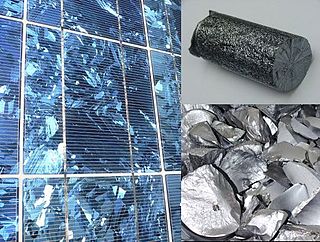
Trichlorosilane (TCS) is an inorganic compound with the formula HCl3Si. It is a colourless, volatile liquid. Purified trichlorosilane is the principal precursor to ultrapure silicon in the semiconductor industry. In water, it rapidly decomposes to produce a siloxane polymer while giving off hydrochloric acid. Because of its reactivity and wide availability, it is frequently used in the synthesis of silicon-containing organic compounds.

Silicon tetrachloride or tetrachlorosilane is the inorganic compound with the formula SiCl4. It is a colorless volatile liquid that fumes in air. It is used to produce high purity silicon and silica for commercial applications. It is a part of the chlorosilane family.

Dow Corning Corporation, was an American multinational corporation headquartered in Midland, Michigan, United States, and was originally established as a joint venture between The Dow Chemical Company and Corning Incorporated. In 2016, Dow bought out Corning, making Dow Corning a 100% Dow subsidiary. After a brief existence as a DowDuPont-owned company, Dow spun out from DowDuPont on April 1, 2019. The new company, Dow Silicones Corporation, which is wholly owned by Dow, specializes in silicone and silicon-based technology, and is the largest silicone product producer in the world.
Hanwha Solutions Corporation is a multinational energy services, petrochemical, and real estate development company headquartered in Seoul, South Korea. The company is part of the Hanwha Group, a large South Korean business conglomerate. Founded in 1965 as Hanwha Chemical, the company was rebranded as Hanwha Solutions in January 2020 when Hanwha Chemical merged with Hanwha Q Cells & Advanced Materials, which itself was formed out of a 2018 merger. The company added the Hanwha Galleria and Hanwha City Development real estate companies to its portfolio in April 2021. The Galleria division and the Advanced Materials division were spun off. The Electronic Materials business, which had remained part of the Advanced Materials division, was also transferred to a subsidiary of the company.

The Renewable Energy Corporation (REC) is a solar power company with headquarters in Singapore. REC produces silicon materials for photovoltaics (PV) applications and multicrystalline wafers, as well as solar cells and modules. It is a wholly-owned subsidiary of Reliance New Solar Energy Limited.

Yingli, formally Yingli Green Energy Holding Company Limited -. Yingli Green Energy Holding Company Limited, known as "Yingli Solar," is a solar panel manufacturer. Yingli Green Energy's manufacturing covers the photovoltaic value chain from ingot casting and wafering through solar cell production and solar panel assembly. Yingli's photovoltaic module capacity is 30 GWs.
Wacker Chemie AG is a German multinational chemical company which was founded in 1914 by Alexander Wacker. The company is controlled by the Wacker family holding more than 50 percent of the shares. The corporation operates more than 25 production sites in Europe, Asia, and the Americas.
Bosch Solar Energy AG was a German solar wafer and solar cell manufacturer, based in Erfurt, which specialized in crystalline silicon-based photovoltaic (PV) products, as well as thin-film modules using amorphous silicon and CIGS absorber materials. The company consisted of various divisions for silicon, wafers, solar cells and modules, research and production facilities in Germany and France and plans were made to open a production line in Malaysia. It has been listed on the German stock exchange since 30 September 2005 and on 19 December 2005 its shares were admitted to the TecDAX. The enterprise was founded in 1997 as ErSol Solarstrom GmbH & Co. KG.
PV Crystalox Solar plc is a supplier to solar cell manufacturers, producing multicrystalline silicon wafers for use in solar electricity generation systems. It has operations in Germany, United Kingdom and Japan and its headquarters are in the United Kingdom. It is listed on the London Stock Exchange and was a former constituent of the FTSE 250 Index.
SunEdison, Inc. is a renewable energy company headquartered in the U.S. In addition to developing, building, owning, and operating solar power plants and wind energy plants, it also manufactures high-purity polysilicon, monocrystalline silicon ingots, silicon wafers, solar modules, solar energy systems, and solar module racking systems. Originally a silicon-wafer manufacturer established in 1959 as the Monsanto Electronic Materials Company, the company was sold by Monsanto in 1989.

Between 1992 and 2023, the worldwide usage of photovoltaics (PV) increased exponentially. During this period, it evolved from a niche market of small-scale applications to a mainstream electricity source. From 2016-2022 it has seen an annual capacity and production growth rate of around 26%- doubling approximately every three years.
GCL-Poly, founded in 1996, is a subsidiary of Golden Concord Group Limited (GCL), a green energy supplier in China, providing power and heat via cogeneration, incineration and wind power. As of 2009 it was the largest supplier of polysilicon in China, and is also a supplier of electronic wafers for the solar industry.

Crystalline silicon or (c-Si) is the crystalline forms of silicon, either polycrystalline silicon, or monocrystalline silicon. Crystalline silicon is the dominant semiconducting material used in photovoltaic technology for the production of solar cells. These cells are assembled into solar panels as part of a photovoltaic system to generate solar power from sunlight.

Polycrystalline silicon, or multicrystalline silicon, also called polysilicon, poly-Si, or mc-Si, is a high purity, polycrystalline form of silicon, used as a raw material by the solar photovoltaic and electronics industry.
Hemlock Semiconductor (HSC) is the largest producer of hyper-pure polysilicon headquartered in the United States. Polycrystalline silicon, also called polysilicon, is a high purity, polycrystalline form of silicon, used as a raw material by the solar photovoltaic and electronics industry.

Activ Solar GmbH, headquartered in Vienna, Austria, was a developer of solar energy. It was engaged in the production of polycrystalline silicon (polysilicon) for the solar PV industry and the development of large-scale photovoltaic power stations in Ukraine. In February 2016, it filed for insolvency.
Daqo New Energy Corp. is a Chinese company engaged in the manufacture of monocrystalline silicon (mono-Si) and polysilicon (poly-Si), primarily for use in solar photovoltaic systems. The company operates a mono-Si and poly-Si manufacturing facility located in Shihezi, Xinjiang Province, China. Daqo formerly manufactured silicon wafers at a facility in Chongqing, China and photovoltaic modules at a facility in Nanjing, China.
Hanwha Qcells is a manufacturer of photovoltaic cells. The company is headquartered in Seoul, South Korea, after being founded in 1999 in Bitterfeld-Wolfen, Germany, where the company still has its engineering offices. Qcells was purchased out of bankruptcy in August 2012 by the Hanwha Group, a South Korean business conglomerate. Qcells now operates as a subsidiary of Hanwha Solutions, the group's energy and petrochemical company.
Tongwei Company is a publicly listed Chinese energy and agricultural company headquartered in Chengdu.






